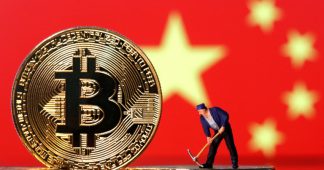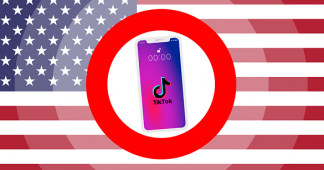Jun 2, 2021
When the Biden administration introduced a recent investigation into the origins of the coronavirus outbreak in Wuhan on Tuesday, the Chinese language response was swift and livid.
Zhao Lijian, overseas ministry spokesperson, accused the US of “political manipulation” and of “stigmatising” China — the kind of common spat that has prompted rising comparisons to the chilly battle.
However only a day earlier, one other announcement informed a distinct story concerning the ties between the world’s two main powers. Goldman Sachs, an emblem of the globally dominant American finance business, unveiled a wealth partnership with the state-owned Industrial and Industrial Financial institution of China. The deal may permit the Wall Road agency to attract on the financial savings of a whole lot of hundreds of thousands of the financial institution’s Chinese language clients.
In an period that’s more and more outlined by geopolitical competitors and a push in the direction of financial “decoupling”, American finance has by no means been nearer to Chinese language wealth.
Seduced by untapped financial savings and a rising asset administration market, price an estimated Rmb121.6tn ($18.9tn) final 12 months, Wall Road’s most storied companies are embedding themselves extra deeply than ever into the nation.
Along with Goldman Sachs, BlackRock mentioned earlier this month it had obtained approval for a wealth administration partnership with China Building Financial institution, whereas JPMorgan Asset Administration introduced in March plans to speculate $415m in China Retailers Financial institution’s wealth unit. From Europe, Amundi and Schroders have gained approvals for majority owned partnerships in wealth administration.
“Inside Goldman Sachs, we’re excited from high to backside,” says Tuan Lam, head of consumer enterprise for Asia ex-Japan on the firm’s asset administration arm. “We’ve clearly been fascinated about China for fairly a very long time and, with the current regulatory adjustments and the market adjustments, we simply have a really excessive degree of conviction across the alternative.”
A department of Industrial and Industrial Financial institution of China in Beijing. ICBC has 680m retail clients, greater than twice the US inhabitants © Florence Lo/Reuters
China, which on one measure now has extra billionaires than the US, is opening its doorways wider than ever to overseas companies. Up to now two years, it has liberalised parts of its tightly managed monetary system and allowed US and European corporations larger entry. Though nonetheless cautious about giving overseas establishments too giant a task, the federal government is raring to attract on their experience to assist construct a financial savings infrastructure that may assist handle an impending demographic disaster pushed by an ageing inhabitants.
Towards that backdrop, some traders say the largest danger is just not stepping into China rapidly sufficient. However any nice China gold rush is just not with out challenges. As with different key areas of the economic system, finance is in the end beneath the sway of an omnipotent Communist celebration that has dominated since 1949.
It additionally sits uneasily in opposition to the geopolitical backdrop, the place tensions between China and the west have flared over points from the coronavirus pandemic to know-how, from Xinjiang to Taiwan. Home politics within the US, additionally, are greater than ever pushed by what President Joe Biden this 12 months referred to as the nation’s most severe competitor.
Jake Sullivan, US nationwide safety adviser, summed up the brand new temper when he wrote in Overseas Coverage journal final 12 months: “Why . . . ought to it’s a US negotiating precedence to open China’s monetary system for Goldman Sachs?”
Altering the funding tradition
Jarvis Li, a 29-year-old analyst at a securities firm in Shenzhen, can’t but afford to purchase a home. He hopes by placing his financial savings in shares, funds and wealth administration merchandise he can at the very least outpace inflation.
“I like merchandise which are safer,” he says, however provides that there are “too many selections” in the marketplace.
Goldman Sachs’ new enterprise with ICBC, during which it should have a majority stake, goals so as to add extra. Its financial savings merchandise will initially goal excessive web price savers and in future might be provided to individuals like Li.
The current flurry of latest financial savings merchandise is a part of an ongoing push to increase funding choices in a rustic the place enormous portions of financial savings have traditionally sat in financial institution deposits or chased after speculative returns in the true property market. Goldman Sachs estimates 60 per cent of all family belongings have been in property in 2020, and an extra 24 per cent have been in money and deposits.
“It’s a nation of savers, however the saving predominantly happens in money and actual property,” says Susan Chan, head of Asia at BlackRock, which now has approval to start operating a three way partnership with CCB and Singapore’s state fund Temasek. “The capital markets, the infrastructure, the best way they have a look at asset administration, it’s nonetheless comparatively younger.”
For the likes of Goldman Sachs and BlackRock, wealth partnerships with Chinese language banks provide huge distribution networks that can permit them to rapidly promote their funding merchandise to the nation’s savers — particularly these with a excessive web price. ICBC has 680m retail clients, greater than twice the whole US inhabitants.
China’s state-owned banking system, the biggest on the planet by belongings, has for years provided “wealth administration” merchandise to its clients, sometimes as a substitute for deposits. However the business has been riven by controversy — particularly concerning its position in shadow finance and the promise of implicit ensures to clients — and underwent dramatic reforms in 2018 that paved the best way for larger overseas involvement.
Whereas companies like Goldman have an extended historical past in China, the current reforms which have swept throughout the whole monetary business will permit them to increase a lot additional.
“The federal government believes that overseas asset managers and overseas banks can characterize a brand new kind of institutional investor, a brand new participant, with greatest observe, a effectively established course of and good requirements,” says Xiaofeng Zhong, chair of larger China at European asset supervisor Amundi, which final 12 months gained approval for the primary majority foreign-owned wealth administration three way partnership. Its partnership with Financial institution of China has already launched over 20 merchandise and gained “billions of {dollars}” in belongings, he says.
What’s actually attracted us to the wealth administration three way partnership is for the primary time it permits managers to extra straight faucet into these giant wealth administration financial savings swimming pools that the massive Chinese language banks have constructed up over time,” says Lieven Debruyne, world head of distribution at Schroders, which gained approval to associate with Financial institution of Communications in February.
In China, the wealth administration sector is only one a part of a jigsaw of financial savings initiatives — alongside an growth in mutual fund companies, which as of final 12 months overseas companies comparable to JPMorgan can now absolutely personal, and an evolution of its pension system.
Census knowledge launched this month confirmed its inhabitants was rising on the slowest price in many years. Over-65s now make up 13.5 per cent of the inhabitants, in comparison with 8.9 per cent in 2010.
“The retirement disaster in China is larger than in another nation on the planet,” says BlackRock’s Chan. She provides that there an pressing want for China to assist its inhabitants get into the funding mindset of, “I would like to save lots of for the longer term”.

A ‘fallacy of management’
For worldwide funding companies, China is the world’s most clear-cut alternative. Whereas rallying markets have boosted their earnings within the quick time period, they face deep structural challenges within the extremely mature markets of Europe and the US.
“Essentially, China is the place the expansion is,” says Richard Grey, a associate in wealth and asset administration at EY.
However he additionally says that, whereas Chinese language regulators and western companies have operated on a realistic foundation up to now, the largest danger is the political atmosphere altering. Grey says the overseas companies may finally discover themselves changing into “a pressured vendor of one thing you helped create” or have issues repatriating earnings, in the event that they fall foul of regulators.
“Coming into a distinct market, you’re very a lot on the mercy of the native regulators,” he says. “Whenever you’re not a part of the membership, there isn’t any political protect in opposition to regulators regulating you more durable than a number of the native gamers.”
In an instance of how rapidly the temper can change, final November’s preliminary public providing of Ant Group — as soon as thought of a fintech nationwide champion — was pulled by the federal government on the final minute.
“China is simply too large a market to disregard, however behind your thoughts is the thought, ‘What can go incorrect?’,” says Greggory Warren, senior fairness analyst at Morningstar within the US. “In China, the foundations and attitudes can change in a single day.”
Peter Alexander, managing director at Z-Ben Advisors in Shanghai, an asset administration consultancy, factors to what he calls the “fallacy of management” on the subject of partnering with Chinese language banks. He means that some overseas members are pushed by “short-term considering” within the rush for distribution.
For his or her half, overseas asset managers usually emphasise long-term shifts. A quota system means outflows from China are tightly managed, however companies hope for larger flexibility to take the nation’s financial savings to world markets. Goldman Sachs, which expects there to be $70tn of investable belongings throughout the nation’s households by 2030, plans to supply “cross border” merchandise to its clients, whereas JPMorgan additionally factors to its “world functionality”.
“Chinese language traders are underweight world offshore markets,” says Desiree Wang, managing director for China asset administration at JPMorgan Asset Administration.
Political danger
Regardless of the enterprise logic, Wall Road’s push into China presents a jarring distinction with the political temper in each nations.
In Washington, scrutiny of American finance’s alliance with China is rising. Republican senator Marco Rubio mentioned this week that Wall Road was changing into “extra tightly built-in with China than ever earlier than”. And he mentioned that “disconnect” was one in every of “our nation’s biggest vulnerabilities” in a confrontation “over who will decide the course of the twenty first century”.
Earlier administrations have pushed for larger entry for US companies in China, mirrored in final 12 months’s section one commerce deal between the 2 nations. However it’s nonetheless unclear how the brand new Biden administration will method the difficulty, particularly given his concentrate on “worker-centric” commerce coverage.
Eswar Prasad, a China finance knowledgeable at Cornell College, means that western companies at the moment are “much less starry-eyed” about doing enterprise within the nation, whilst they proceed to “lust” after its ever-wealthier residents.
“These companies should undertake numerous contortions to keep away from getting caught within the crossfire,” he says. Whereas they nonetheless have “potent lobbying machines,” he provides, “their effectiveness in influencing US coverage towards China has change into extremely constrained by the present political local weather”.
That temper was on show at a congressional listening to on Thursday when monetary chiefs have been questioned about their China ties. David Solomon, Goldman Sachs chief government, mentioned the US-China relationship is “extremely complicated”.
“There are locations the place clearly we co-operate, there are locations the place we’re confrontational,” he mentioned. “We attempt to navigate that in an acceptable approach.”
Extra reporting by Qianer Liu, Tabby Kinder and Joshua Franklin
Published at digitpatrox.com











